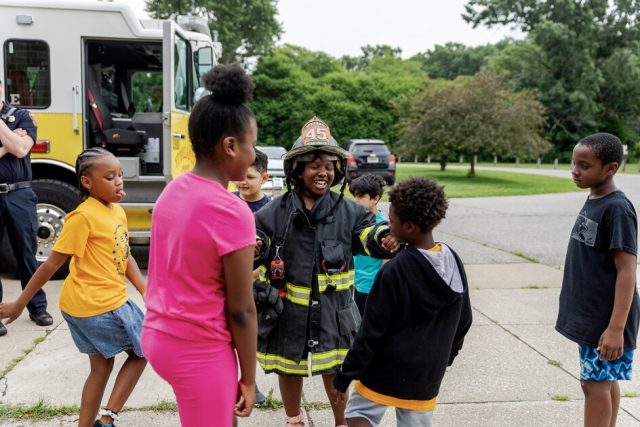[ad_1]
For the fourth summer in a row, Ypsilanti Community Schools in southeast Michigan’s Washtenaw County is operating Grizzly Learning Camp, a free seven-week summer learning program for students in prekindergarten through 12th grade. Like traditional summer school programs, it offers academics. But, as its name suggests, it doesn’t feel like a traditional summer school.
“The students aren’t sitting in a row in the classrooms,” said Alena Zachery-Ross, the superintendent in Ypsilanti, located outside of Ann Arbor.
The academics, driven by project-based learning, might include staging poetry slams, learning math from a teacher who uses rap as a vehicle for instruction, or exploring the outdoors to learn about invasive plant species. This summer, 1,423 students—more than a third of the district’s student body—is participating in the popular program, which boasts an attendance rate of over 80 percent. It’s also boosting some academic performance numbers in the district, whose reading and math scores, as well as its graduation rate, rank among the lowest in the state.
But despite its popularity and success, the summer learning camp’s future is uncertain. Its funding comes largely from federal COVID relief money—aid set to expire this fall.
“With this program, we’re closing the learning gap,” said Zachery-Ross. “The momentum continues over the summer if students engage [in summer learning]. But with funding going away, we’ll have to balance this with competing needs that we have during the school year. That’s the challenge.”
It’s a predicament that’s likely to resonate with school systems across the nation.
An estimated 8 in 10 school districts have spent some of their federal COVID relief money on after-school or summer learning, according to a 2023 report by the nonprofit Afterschool Alliance, which advocates for after-school programs. COVID relief fund spending on summer programming amounted to $2.4 billion among 4,618 districts whose budgets were publicly available, according to the alliance’s report. (There are about 13,000 school districts nationwide, and they collectively received about $190 billion in COVID relief funds, split into three rounds.)
Ypsilanti’s summer learning program costs $1.7 million to operate annually. The bulk of funding comes from ESSER money, with the help of a supplemental grant. So as this season’s Grizzly Learning Camp approaches its midpoint, administrators are thinking ahead to next summer and what they will have to trim from the robust program to keep it going without ESSER.

The switch from traditional summer school to a learning ‘camp’ was intentional
Before the pandemic, Ypsilanti had a traditional summer school program that was a requirement for students who were struggling academically. It also had a negative stigma attached to it, according to Zachery-Ross.
After schools reopened following pandemic closures, the district changed its approach, seeking to deliver a summer learning program that would engage all students in learning recovery. The result was Grizzly Summer Learning Camp.
“We call it camp instead of school,” said Zachery-Ross. “That’s intentional.”
So, too, is how the camp runs.
Academics are central. Daily, students write in journals, read, and do math. But it doesn’t always look like traditional learning, Zachery-Ross said.
While it’s difficult to gauge the program’s overall impact on academic recovery, the district’s limited data indicate some positive trends. Third grade reading scores for students attending camp have shown modest increases. And, since the camp’s inception, participating high school students have recovered approximately 515 credits (for reference, most districts in Michigan require at least 18 credits to graduate).

Local partnerships—with the University of Michigan Museum of Natural History, Eastern Michigan University, the Michigan Learning Channel, a local farm, the Henry Ford Museum, Toyota, and others—create opportunities for field trips and guest visits at the learning camp.
At the end of each week, students take field trips that connect with what they’ve learned during the week.
“We really try to partner with all the people in our community to make these hands-on things possible,” Zachery-Ross said.
The district faces tough choices: how to pare back a popular program
While the district keeps the entire program free for students, the offerings don’t come cheap.
In addition to field trip costs, other camp expenses include students’ daily transportation, two meals each day plus snacks, and higher-than-average teacher pay ($40 per hour).
“We’re pushing the [ESSER] funding all the way to the end to cover the camp this summer. This is it,” said Zachery-Ross. “Some of the things we offer can be scaled back, but some of it we really want to keep.”
The district is grappling with how it can trim some costs from the summer program while keeping it in operation.
Free transportation to and from camp, held at school campuses throughout the 3,700-student district, may need to go, explained Zachery-Ross.
This likely would leave some students unable to participate. Some field trips may be eliminated, too, cutting back on learning opportunities that excite students.
One of the camp’s popular trips has been to the Toledo Zoo, an hour’s bus ride away. That transportation cost, along with zoo admission, however, may not be sustainable, Zachery-Ross said.
Reducing the number of grade levels eligible to attend the camp is yet another cost-saving measure under consideration.
“We’re making some really hard decisions,” Zachery-Ross said.

Summer programming nationwide faces an uncertain future post-ESSER
In a 2023 survey of 650 superintendents across 47 states, more than half of the district leaders said they planned to decrease or eliminate enrichment and summer-learning offerings at the start of the 2024-25 school year, corresponding with the deadline for committing the last and largest round of ESSER funds.
In some ways, Ypsilanti could be well-positioned to keep its summer camp running.
In its 2023 report on the use of ESSER funds for summer and after-school programming, the Afterschool Alliance suggested strategies for keeping summer programming going after ESSER. Among them were leveraging community partners and planning ahead—both tactics Ypsilanti already has employed.
“We knew the cliff was coming,” Zachery-Ross said. “The planning for the next year starts the day after the camp ends.”
[ad_2]
Source link











